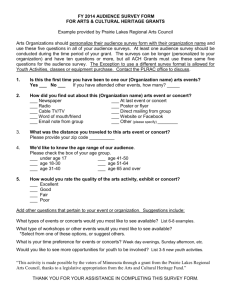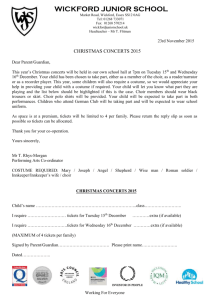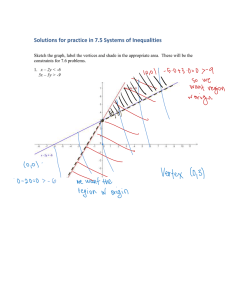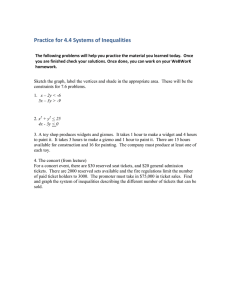Civitas_Ge.doc
advertisement
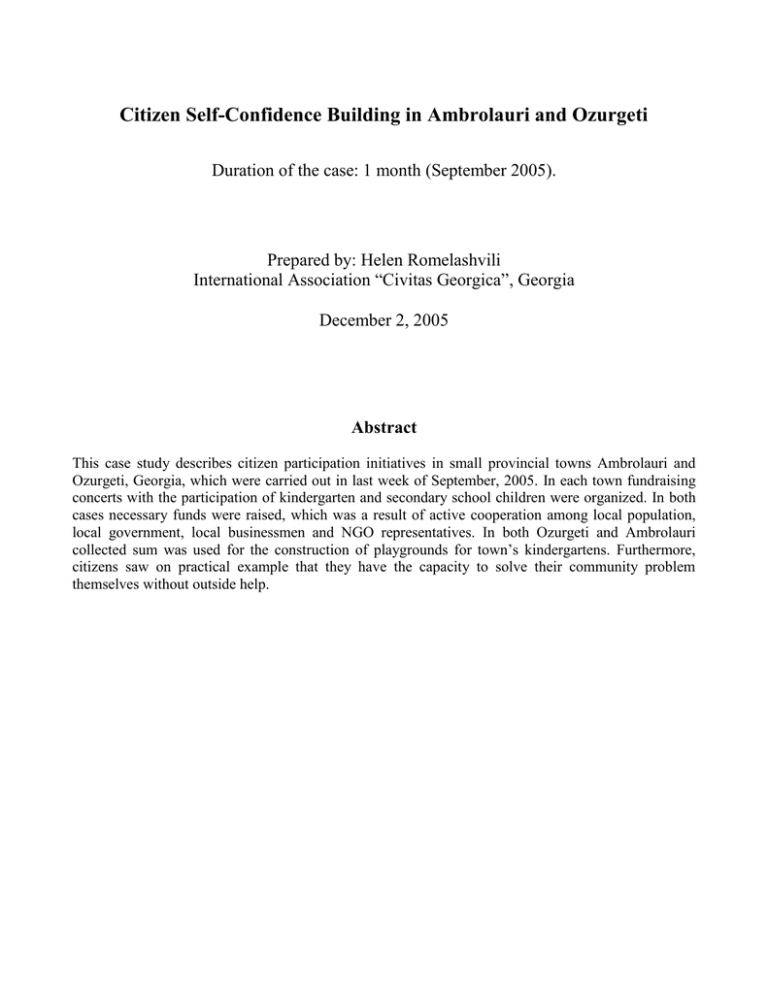
Citizen Self-Confidence Building in Ambrolauri and Ozurgeti Duration of the case: 1 month (September 2005). Prepared by: Helen Romelashvili International Association “Civitas Georgica”, Georgia December 2, 2005 Abstract This case study describes citizen participation initiatives in small provincial towns Ambrolauri and Ozurgeti, Georgia, which were carried out in last week of September, 2005. In each town fundraising concerts with the participation of kindergarten and secondary school children were organized. In both cases necessary funds were raised, which was a result of active cooperation among local population, local government, local businessmen and NGO representatives. In both Ozurgeti and Ambrolauri collected sum was used for the construction of playgrounds for town’s kindergartens. Furthermore, citizens saw on practical example that they have the capacity to solve their community problem themselves without outside help. Background This case study describes citizen participation initiatives in small provincial towns Ambrolauri and Ozurgeti, Georgia. We chose this particular case to demonstrate how simple, small-scale event can have a long-term positive effect and inspire people for future actions. Ambrolauri is a tiny town with population only 2545 people located in mountainous region RachaLechkhumi. The distance from the capital Tbilisi is 227km. Population is very poor, employment situation is striking. The town and the region have been left beyond attention of international organizations. Population is not publicly active. Ozurgeti is administrative center of Guria region with population 27 528 located 321 km to the West of Tbilisi. Guria region is also rich with mountains, agricultural lands are few, and unemployment is a problem. However, unlike Ambrolauri, Ozurgeti has comparably strong civil society; many local NGOs are very active and successful in attracting financial investments and collaborating with local government and donors. Overall social and economic situation in rural areas of Georgia is harsh. Unemployment rate is very high and no new jobs are created; there are no opportunities to receive higher education, there is no entertainment for young people. Due to these problems population (especially youth) from all over the country migrates to the capital. Those who remain, look up to government to solve their problems and ease their hardship. Political events of November 2003 in Georgia, when as the result of “Rose Revolution” Shevardnadze’s government was replaced, was highest form of expression of people’s will and involvement in political life. However, this level of citizen participation has not been maintained in the following years. On day-to-day basis Georgian citizens are passive in their public lives, awaiting cardinal reforms from above. It is clear that even after the change of government, society still does not see its role in the development processes that are taking place in the country. About the organization For detailed information about International Association Civitas Georgica, please visit www.civitas.ge Concept As long as an ordinary person in Georgia does not think of himself as a full-fledged citizen who can influence and direct decision-making in his country, democratic processes in Georgia would move at a very slow pace. In this environment, assisting population in rural areas to acquire the knowledge and skills required to promote change and participate actively in public life of their communities, becomes very important. Many national and international organizations have taken steps to increase citizen participation level in Georgia. Some efforts had positive results such as mobilizing communities around village problems, establishing collaboration practices between local government and local population by financing infrastructure projects etc. Unfortunately, very few of these results are sustainable in long-term perspective. It is crucial to change citizen physiology, to make them believe in their own strength and abilities. From this point of view, the case described here is a unique demonstration of the fact that community often has abilities and resources for the solution of its local problems. 2 Objective The specific objective of the citizen participation initiative described in this case was to build selfconfidence of the population of Ambrolauri and Ozurgeti by demonstrating that they have the ability to solve their community problems. Methodology Methodology used for the citizen participation initiatives described in this case were organization of PR campaign and fundraising concerts. These methods were chosen since they are relatively simple to implement and not expensive (costs are important for such poor towns as Ambrolauri and Ozurgeti). These initiatives were organized during Citizen Participation Week at the end of September, 2005. (For details about CPW, visit http://www.ceecn.net/cpw ) For PR campaign the following methods were used: information dissemination through local and central newspapers, photo exhibition reflecting citizen participation initiatives in different countries, distribution of T-shirts and posters with the slogan “Working Together”. It was decided to organize children from kindergartens and secondary schools of Ambrolauri and Ozurgeti to perform in the fundraising concerts rather than invite pop-stars from Tbilisi for the obvious reasons: children would perform on voluntary basis, while involving stars is expensive. Furthermore, parents and other citizens would rather spend money to see their own children/members of their community perform. To raise funds from the concerts tickets were printed and distributed among population. In Ambrolauri, original idea was used: at the back of the ticket three community problems were listed. Citizens/children had to select a problem of top priority for them and vote. Money collected from the concert would be spent on the resolution of the issue selected by the population itself. Realization of the initiatives described in this case would never be possible without willingness and active collaboration of NGOs, local government and self-government, administration of schools and kindergartens in Ambrolauri and Ozurgeti. Financial support for printing of tickets, T-shirts and posters was provided by OSCE mission to Georgia. Implementation On September 27, 28, 30 Civitas Georgica with the help of Young Scientists Club of Ozurgeti and big support from local government organized fundraising concerts in the new movie theater in Ozurgeti. Children from the three kindergartens of the town took part in the concerts. They performed songs, national dances, poems and received balloons, flowers and applause for their enthusiasm. The concerts attracted about 1000 people. Total sum of 1167 GEL (about $650) was collected. It consisted from the amounts paid for the tickets by the parents of the children (142 GEL), local businessmen (400 GEL) and local NGO representatives (225 GEL). Missing sum (400 GEL) was allocated by local government. The funds raised from the concerts were used for the arrangement of playgrounds for children in the three kindergartens. The event was covered by local media. On September 27, Civitas Georgica with the help of Local Council Association of Racha-Lechkhumi and support from local government, local education and cultural departments organized fundraising concert in the park of Ambrolauri. Kindergarten as well as secondary school children of Ambrolauri participated in the concert. Many songs, poems and dances were performed. Children were wearing CPW T-shirts. 3 The event brought together over 2000 people. Concert tickets contained three options (selected based on consultations with local government) on how the raised funds should be spent. The options were as follows: 1. Equipment for a sporting gym in one of the schools. 2. Arrangement of playground for kindergartens. 3. Reconstruction of soccer field. Children had to vote for one of the options and put their tickets in a transparent box (like in real elections). As the result of this voting option #2 was given priority. Total of 600 GEL was collected from the sale of the tickets. This sum together with 400 GEL contribution of local & regional government was spent on the arrangement of the playground for kindergartens in the city of Ambrolauri. Results/Analysis We believe that objectives of the initiative described in this case were achieved. This is demonstrated by great enthusiasm of local population of Ambrolauri and Ozurgeti prior to, during and after the concerts, their active participation and support of the initiative. It can be measured by the number of people, who took part in organization and implementation of the activity. The initiative was also successful in raising public self-confidence in the two towns. This was clear from the feedback provided by the participants of the events. Besides, in the weeks which followed the concert, several organizations approached the organizers expressing their desire to organize similar events more often. It is important that in preparation and realization of the fundraising concerts active collaboration between local government, NGOs, local media, businessmen and population was observed. For instance, in Ambrolauri NGOs worked in close collaboration with local government, local education and culture departments to help with distribution of tickets and other organizational issues. This cooperation continued afterwards, since once necessary funds were raised during the concerts, construction of the playground for the kindergartens in Ozurgeti and Ambrolauri has begun. People involved in the playground construction realized that successful completion of the works requires strong partnership of the society/NGOs and local government. The concerts also had strong psychological effect; people saw how they can solve their own local problems themselves, with the resources of their own community. This is something they would remember for the future, creating a long-term positive effect on the development of their communities. Our society needs to change its mentality from the one waiting for the government to take care of all its needs, to the active initiator and participant of resolution of its problems. In that sense implementation of described activities is a step towards the change of the physiological state of our population and building their self-confidence. Success factors/Risks/Recommendations Key factors, which contributed to our success, were: 1. It was innovative idea in the environment where people do not have any entertainment opportunities. There are no movie theaters, no drama theaters, no other public places for entertainment in Ambrolauri and Ozurgeti. Thus, any activity such as concert was greeted with enthusiasm. 4 2. The idea and coordination of the activities belonged to Civitas Georgica, but concerts were organized by local NGOs, who have more trust in local population. 3. Problems on the back of the tickets were chosen based on needs assessment, they reflected real needs of community. As for the risks we encountered, well one of the risks was weather, since the concert was to be organized in the park, in the open air. Another risk was that not enough funds would be raised from the concert to tackle the problem. In this case we would require additional fundraising, which would take extra time. In the meanwhile we might have lost trust of the population. Our recommendations for those, who would try to copy the method is to proceed with care. Not every community problem can be solved by fundraising. To take into account general context/environment is very important. Also, one has to be careful in choosing the local problems (to be placed on the back of the tickets). They have to be realistic in terms of costs and actuality. Contacts information: The case was prepared by Helen Romelashvili, Program Manager of Civitas Georgica. For your questions and comments please fill free to contact Ms. Romelashvili at: 97 Tsinamdzgvrishvili St Tbilisi, 0164, Georgia Tel: (995 32) 951991 Fax: (995 32) 911948 Email: hromelashvili@civitas.ge 5
